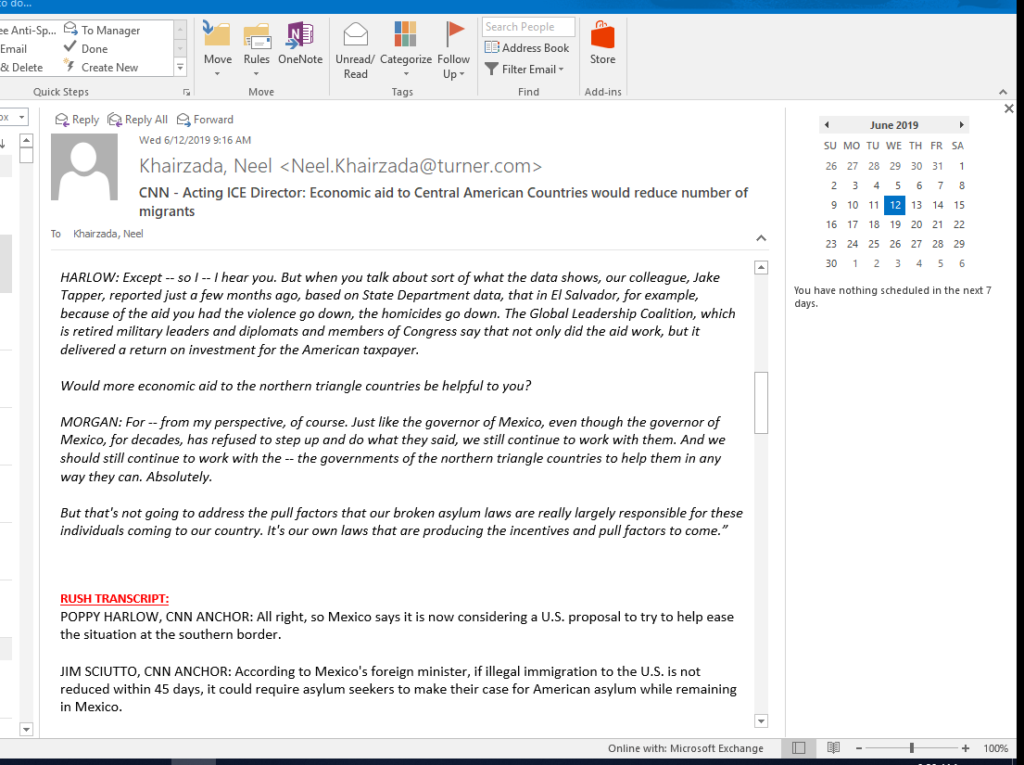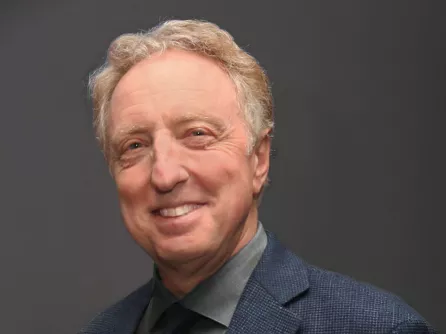CNN Flat-Out Distorts Acting ICE Director’s Remarks

Last September, the Columbia Journalism Review (the preeminent journal covering the media) ran a story with headline, “Most Americans say they have lost trust in the media.” The report was based on a survey conducted by the Knight Foundation and the Gallup polling organization.
In most cases, the media don’t blatantly lie. They simplyselect facts that support their own biases, and omit facts that do not fittheir narrative. There’s a reason why witnesses at trials are required to swear“to tell the truth, whole truth, and nothing but the truth.” Much like the oldbaseball adage, “a half swing is a whole strike,” a half truth is the same as awhole lie.
An email that popped up in my inbox from CNN on Wednesday both piqued my interest, and affirmed the public’s mistrust of the news media. The subject line read: “CNN — Acting ICE Director: Economic aid to Central American Countries would reduce number of migrants.” The body of the email included a transcript of Acting ICE Director Mark Morgan’s interview on CNN’s Newsroom broadcast. It sounded interesting, so I read it. Twice.

The reason I read it twice was because nowhere in the transcript could I find anything that Morgan said that supported CNN’s assertion that he believes economic aid to Central American countries would reduce the number of migrants. To be fair, he didn’t say it wouldn’t; but nowhere in his remarks did Morgan say that economic aid was the cure, or even a partial cure, for the migration crisis.
The interviewer, Poppy Harlow, came loaded with a “gotcha”question for Morgan. The Trump administration recently cut economic aid to theprimary migrant-sending countries, both because it was the only leverage theyhave to get those governments to do more to address conditions in thosecountries, and because the economic aid clearly isn’t helping the people whoare fleeing those countries.
In the interest of presenting the whole truth, to follow are interviewer Poppy Harlow’s exact questions and Morgan’s exact answers regarding the efficacy of economic aid in reducing migration: (You can also watch the interview here.)
Harlow: You testified before the senate Homeland SecurityCommittee back in 2016 and you said, quote, there are definite push factors,weak economies, weak government, violence, family reunification and economicquality. So you point to the economy as a big driver of those people to theUnited States. But as you know, just a few months ago, the Trump administrationcut all economic aid to the northern triangle countries. And I just wonder ifyou’re worried that that is going to make the situation worse and if that hasexacerbated the — the crisis.
MORGAN: So, from a law enforcement perspective, if youlook at that, with the information intelligence shows that they are coming herelargely for economic equality and then to some degree for family reunification.And what we’ve shown, regardless of what’s happening or not in the northerntriangle countries, the numbers continue to exceed. And they really continue toexceed because of the incentives.
Right now — and the cartels are making sure that — thateveryone in the northern triangle countries know, if you grab a child and youcome to our borders, you will be allowed into the United States, and largely toremain there untouched. They know that. That’s what’s driving them to come, theoverwhelming. But right now 75 percent — up to 75 percent of the people comingacross are family units or unaccompanied children.
Do you see anythingin Morgan’s response that indicates a belief that economic aid reducedmigration? Neither did I. In fact, he is pretty emphatic that what is drivingmass migration is that showing up with a child in tow pretty much guaranteesthat you will be allowed to “remain [here] untouched.”
Not deterred by thelack of the desired response, Harlow tries again. So, again, here is exactlywhat she asked and exactly what he answered:
HARLOW: Except — so I — I hear you. But when you talkabout sort of what the data shows, our colleague, Jake Tapper, reported just afew months ago, based on State Department data, that in El Salvador, forexample, because of the aid you had the violence go down, the homicides go down.The Global Leadership Coalition, which is retired military leaders anddiplomats and members of Congress say that not only did the aid work, but itdelivered a return on investment for the American taxpayer.
Would more economic aid to the northern trianglecountries be helpful to you?
MORGAN: For — from my perspective, of course. Just likethe governor of Mexico, even though the governor of Mexico, for decades, hasrefused to step up and do what they said, we still continue to work with them.And we should still continue to work with the — the governments of thenorthern triangle countries to help them in any way they can. Absolutely.
But that’s not going to address the pull factors that ourbroken asylum laws are really largely responsible for these individuals comingto our country. It’s our own laws that are producing the incentives and pullfactors to come.”
This time Morganagrees that, in the abstract, economic aid to the Northern Triangle countrieswould be “helpful,” and that we should “continue to work with” and “help [thesecountries] in any way we can.” Still, far short of a definitive declarationthat doing so would stem the mass migration. In the context of his entirestatement, it is clear that Morgan is saying that under the rightcircumstances, economic aid could be beneficial to addressing some of theeconomic push factors of mass migration.
But, even moreimportantly, in the very next breath, Morgan does make a definitive assertion.About as unambiguously as it can possibly be stated, Morgan asserts that it isthe pull factors – namely our own laws – that are the driving force behind themigration crisis.
If I’m umpiringthis game, I’m calling CNN’s headline a half swing and a whole lie.

